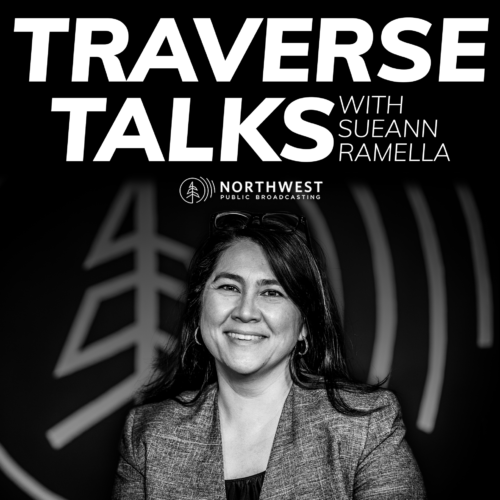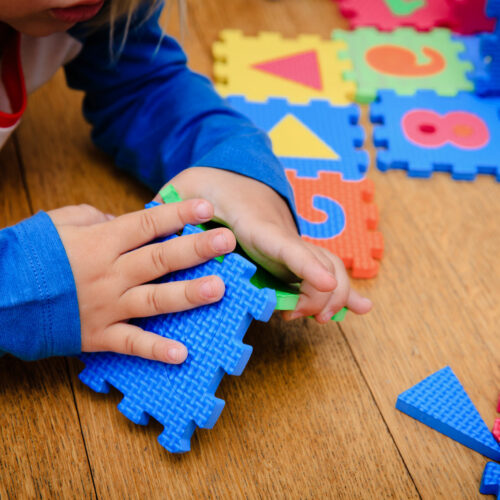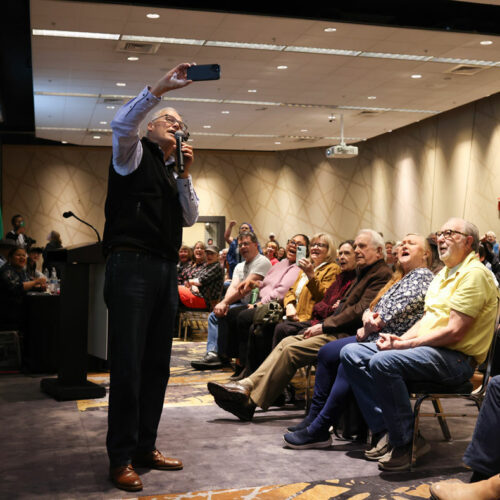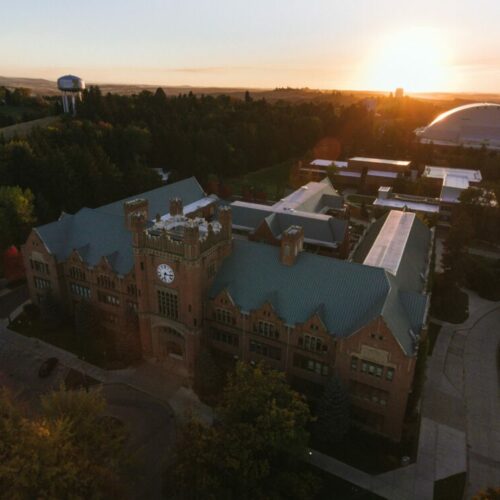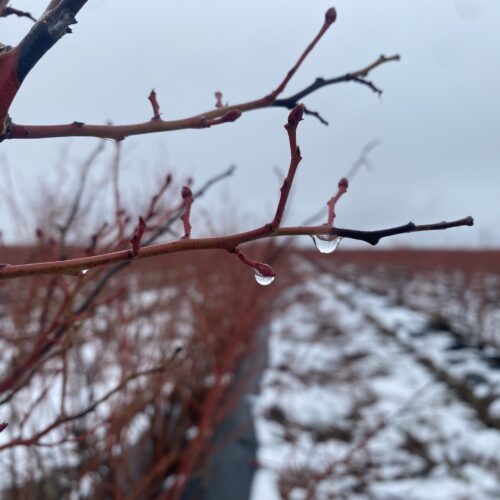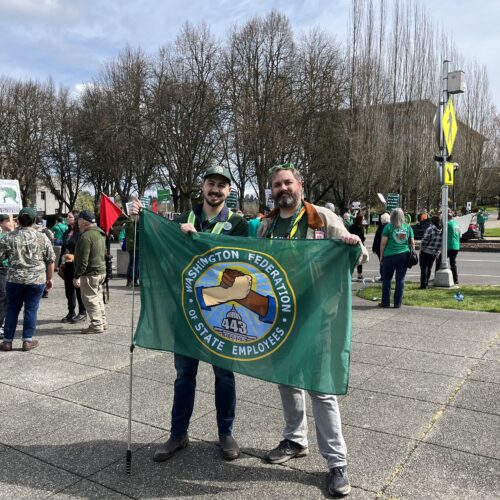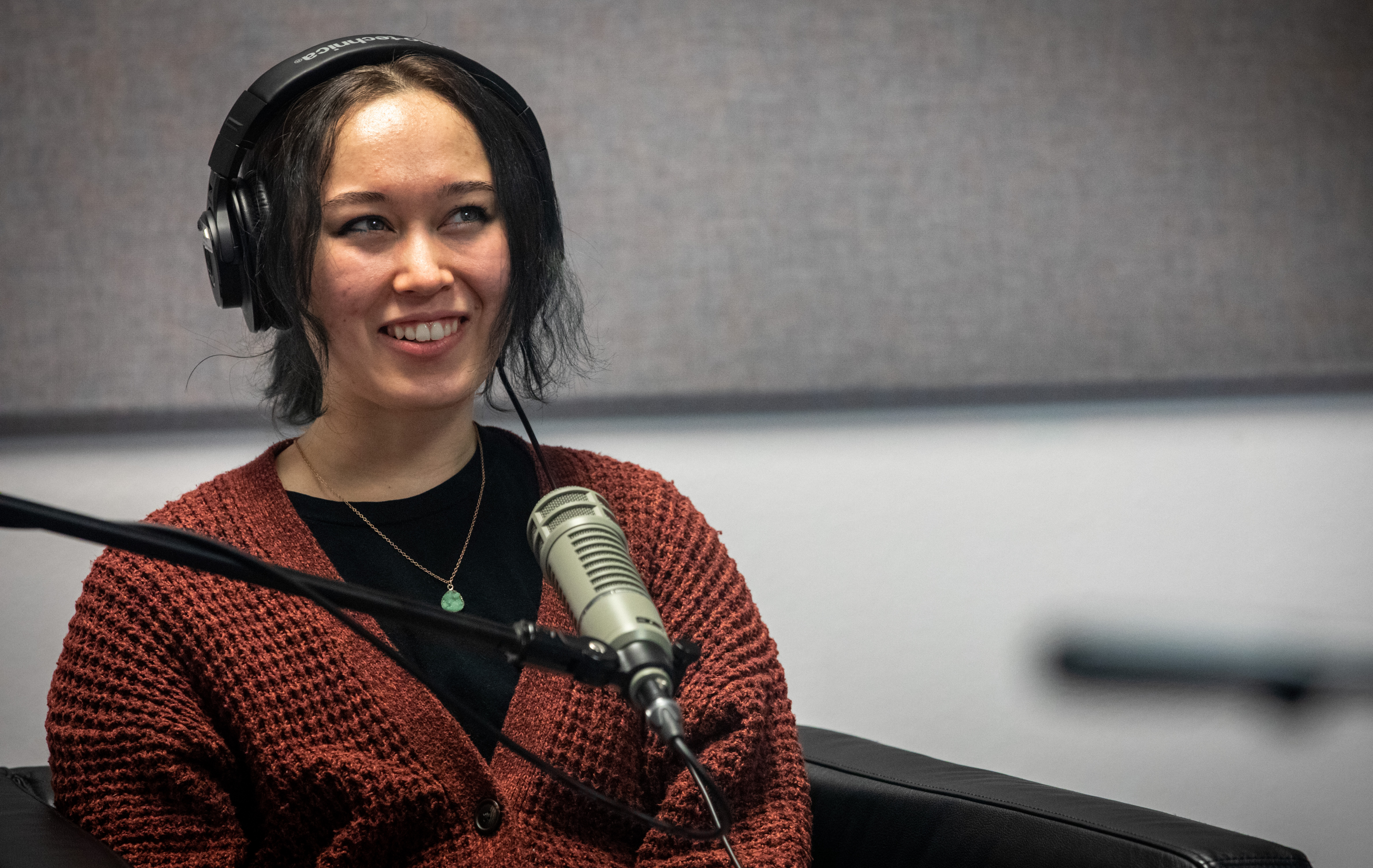
Would You Sacrifice Humanity For A Chance At Divinity? ‘Traverse Talks’ Episode 37 – With Author Zoe Hana Mikuta
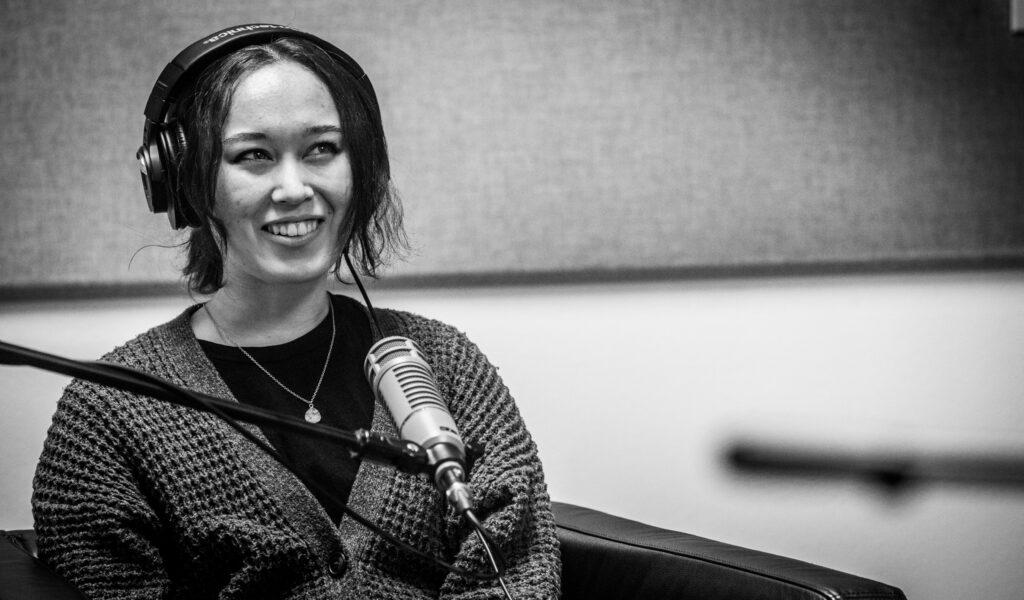
Zoe Hana Mikuta is the young author of the YA science-fiction novel, “Gearbreakers” and its recent sequel “Godslayers”. She started writing this series while still in high school, featuring characters she related to and wished she had access to in the media. During the writing process, Zoe ended up learning more about her own identity as a Korean-American, queer woman. Listen to this episode of ‘Traverse Talks’ with Sueann Ramella’ to hear a thought-provoking conversation about her journey of self-discovery and the blurred lines between humanity and divinity.
SUBSCRIBE: Spotify / Apple Podcasts / NPR One / YouTube
Listen
Conversation Highlights:
Discovering Herself By Representing Herself
Sueann Ramella: Zoe, can you give the plot of “Gearbreakers?”
Zoe Hana Mikuta: “Gearbreakers” is about a nation that’s controlling their underlings, the Badlands, with 200-foot mecha deities, and there are renegades out in the Badlands Desert called “Gearbreakers,” and they’re tasked with taking down these mechas from the inside out. So they infiltrate and they mess around, and they’ll topple the deity. And what happens is that, Eris, who’s a cold-hearted Gearbreaker, cold-hearted soldier, she gets captured by this evil nation called Godolia, and she meets Sona Steelcrest, who’s one of the mecha pilots, and they find that they have similar loyalties. And they end up falling in love. And with that, I don’t think I was specifically going into the project being like, ‘Yes, they’re gonna be like a sapphic love story type of thing.’ Just like halfway through Gearbreakers, I was like, ‘Oh my God.’ Did not really suspect that I might have been queer, even though I was like halfway through this book. And I was like, “Oh my God. I’m like fetishizing sapphic relationships. Why am I doing this?” And then, I finished the book, and I was like, “This is what I find romantic and it’s sapphic and it’s nice.”
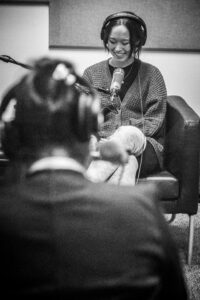
Zoe smiles as Sueann Ramella asks questions about her book.
Sueann: That’s so interesting. So it was during the creation of this book that you were learning about yourself and your sexual identity. Well, how about your racial identity? Because the characters are also of Asian descent. So did you influence these characters with that?
Zoe: Yeah, so both my characters are half Korean. Sona specifically fits my demographic more where she’s half white and half Korean. And I just did that because, you know, it’s of course easier to write from your own demographic. But also, I didn’t grow up finding a lot of Wasian characters in media. So in the back of my head I was like, yeah, it’d be really cool if someone who was growing up half white and half Asian and was able to find this representation when I necessarily didn’t. And just like, it’d be cool to have some contributing factor to that.
Sueann: Yeah, it’s a big deal. I mean, you’re younger than I am. So I assume that you had some shows like this. But no, really, it wasn’t until the last, I don’t know, maybe five years that we started seeing more representation on even Netflix.
The World We Live In Is A Part Of Who We Are
Sueann: The character is essentially a part of the machine, right? Because she gets her body augmented to run the machine. For the mechs, the deities. So she is essentially a part of this thing?
Zoe: Yeah. I wanted the concept to be like, it’s only black and white because you’re born on the side of black or white, like Godolia or the Gearbreakers. And in Godolia, it’s like, “the government is so merciful, because they’re giving us the chance to become gods.” And Sona, of course, is secretly not from Godolia originally. So she has that kind of outer perspective to be like, “This entire thing is really, really flawed, and you can’t even see what they’re doing to you. They’re dangling divinity in front of you and you’re really exchanging your morality for that?” So yeah, when she gets augmented, because she is trying to get revenge, it is like this reflection physically that she is getting corrupted in her head too, because she is giving in to her harsher aspects because she does want revenge so badly. But she does, in some part, let that happen to herself because it’s like, just the kind of world that-
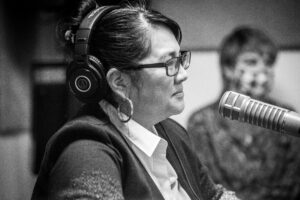
Sueann sits thoughtfully listening to Zoe. Producer Ash Beard sits in the background.
Sueann: That she’s in, yeah. Kind of like a victim in surviving in the world that’s presented to you. But there’s to me a lot of symbolism, though, about how much of her is still human and how much is now the machine, and the greater society that she’s a part of. And she has these conflicts, right? In your view, what’s the purpose of staying in touch with your humanity if you’re in this world with all this high tech?
Zoe: I think humanity, at least in terms of “Gearbreakers,” it definitely stems from human relationships. Like what do we mean to each other? And maybe like what do we owe to one another? Or like what could we mean to each other, is also like the possibility side of it. And it’s also just like the little intimate scenes where the kids are just hanging out, and they’re just being kids, like also just very fun to write. You know, I was trying to convey no matter how bad the world gets, with all this evil technology and all these things that wanna kill them, there’s still good. There’s all this bad, and there’s always still gonna be good despite it.
The Ability To Pursue Happiness Instead Of Money
Sueann: So at a young age, you’re published. How do you stay grounded? Is there now more pressure to do more great successful stories?
Zoe: There’s a part of it that’s definitely motivated by the money of it. And I really have to check-in that I’m doing this because I enjoy it, and not because I’m trying to make a living type of thing. Because I can definitely tell when I’m reading a book, like, is the author enjoying themselves writing it? And so there’s times I need to step back, because I do get stressed about the money of it. And be like, ‘No this is really what I wanna do.’ And if the money is tight in the future, that’s fine because it’s just like I’m getting so much happiness from it, honestly. So, I’ll figure it out in the future. I just have to trust in it and trust that everything else will work out because I’m putting this amount of energy in the universe. So I think it’ll all pan out.
Sueann: I like that. But I’m also curious because of what I know of Korean culture that not a lot of conservative traditional Korean folks let their kids pursue happiness. So how is that possible for you and your mom? 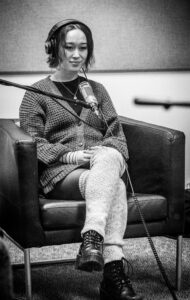
Zoe: Oh yeah, so I’m in a really good relationship. Like my mom’s, she’s American. She immigrated here from South Korea when she was nine, so she grew up here. Still fluent in Korean, but definitely like has a different perspective on things than maybe her mom does. And my aunt was telling my mom like, “You can tell that we’ve achieved the American dream because our kids can be artists.”
Sueann: How did that make you feel when you heard that?
Zoe: I just feel incredibly lucky that I’m able to pursue that. I have the appreciation for their perspective, because I know that’s not the perspective that they were growing up with from their parents.
*Question and responses were edited for length and clarity
Related Stories:
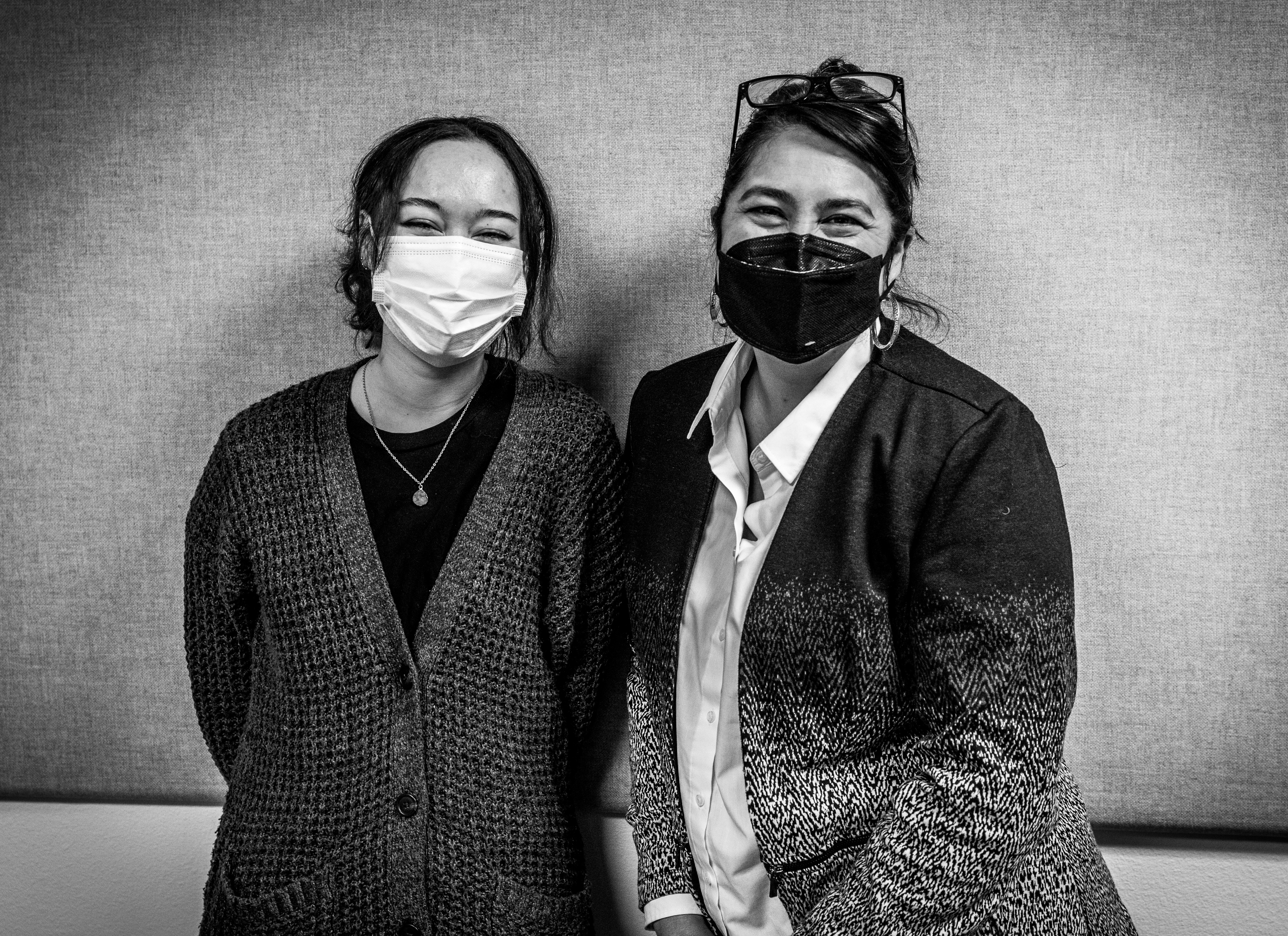
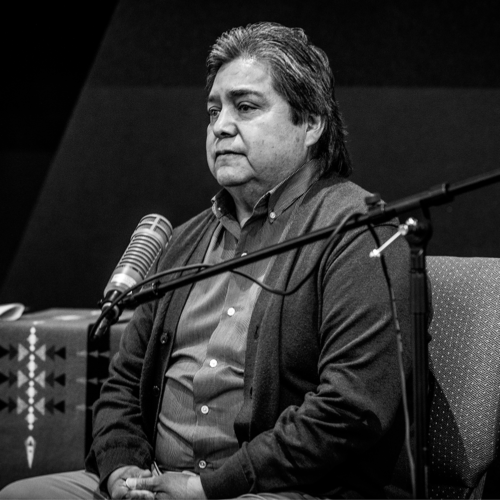
Captive Returns Home: The Story Of Wetxuuwíitin – ‘Traverse Talks’ Episode 42 – With Chairman Samuel Penney
Photo of Sam Penney recording Traverse Talks at the Nez Perce National Historic Park on March 10, 2022. Imagine a stranger took your family’s heirlooms and then offered you an
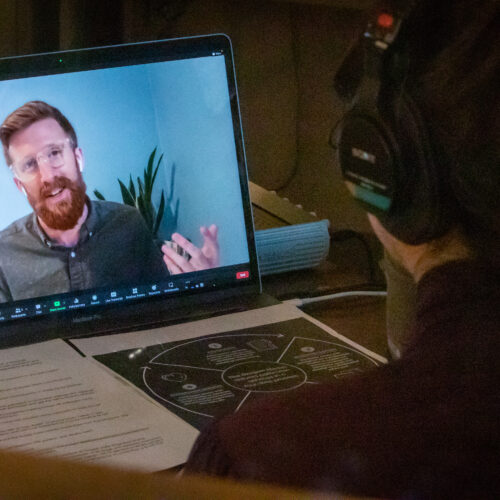
Psilocybin: Psychology, Policy and Possibilities – ‘Traverse Talks’ Episode 41 – With Sam Chapman
Sueann Ramella interviews Sam Chapman virtually on April 19, 2022. What do you really know about psilocybin, commonly known as magic mushrooms? Research on the substance has lagged behind in
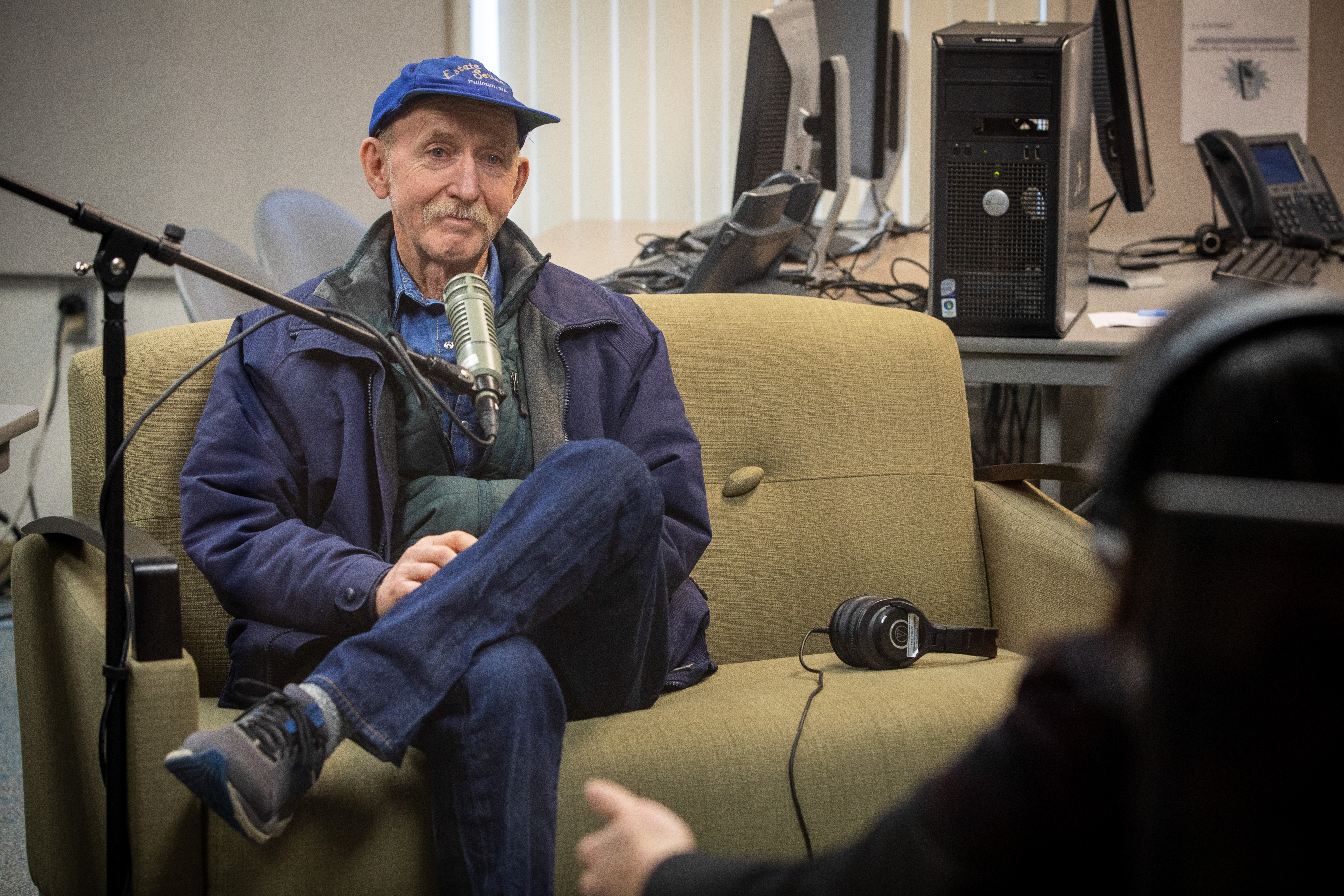
You Inherited A House Full Of Stuff. What’s Next? ‘Traverse Talks’ Episode 38 – With Estate Services Owner Rich Old
Rich Old recording this episode of Traverse Talks on March 3rd, 2022. Grieving the loss of a loved one is already hard enough. To make matters worse, many people have

